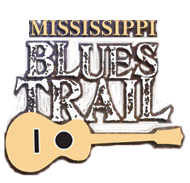William R. Ferris
William R. Ferris - Vicksburg
The long and distinguished career of William “Bill” Ferris, one of America’s leading folklorists, was inspired by the blues, religious music, and stories he heard while growing up on his family’s farm in rural Warren County. Ferris documented Mississippians through recordings, books, film and photography, and brought broader recognition to the blues and other folk expressions through his advocacy work in academia and at the National Endowment for the Humanities.
William R. Ferris was born in Vicksburg on February 5, 1942, and was raised 17 miles southeast of the city on his family’s farm, Broadacres. African-American residents there introduced Ferris to the blues, the music of their church on the farm (Rose Hill), and Nashville R&B radio station WLAC. His early exposure to African-American music was furthered during visits to Vicksburg, where he attended shows by groups including the Red Tops and the Knights.
Ferris began documenting life and music on the farm while still in high school, and at Davidson College became involved with folk music and the Civil Rights Movement, passions he brought back to the Vicksburg area. A visit to Ireland sparked Ferris’ interest in studying folklore, which he pursued at the University of Pennsylvania. His doctoral dissertation focused largely on the circle of musicians surrounding Leland bluesman James “Son” Thomas, and parts of it appeared in the first of his many books, Blues From the Delta (initially published in England in 1970, revised in 1978). Ferris’ blues recordings of Thomas, Scott Dunbar, Lee Kizart, Lovey Williams and others were issued on albums by various labels in England and the U.S. He also documented his wide-ranging fieldwork through 15 films, including Give My Poor Heart Ease, Mississippi Delta Blues, and Gravel Springs Fife and Drum.
In 1970 Ferris returned to Mississippi to teach at Jackson State University, and his public advocacy work for the arts at the time included cofounding, with Judy Peiser, the Memphis-based Center for Southern Folklore. Ferris’ film work led to a position at Yale University, where he brought Son Thomas and B.B. King to his classrooms. In 1978 Ferris became the founding director of the University of Mississippi’s Center for the Study of Southern Culture, which brought a new respectability to studies of everyday life in the South. Through his efforts the university acquired Living Blues magazine in 1983 along with the three collections that formed the core of the Ole Miss library’s Blues Archive, from B.B. King, Living Blues, and Ferris’ University of Pennsylvania mentor, folklorist Kenneth Goldstein. While at the Center, Ferris coedited the Encyclopedia of Southern Culture, hosted Mississippi Public Broadcasting’s blues radio show “Highway 61” and released more field recordings of blues, country, gospel, and fife and drum music on the Center’s Southern Culture label.
From 1997 to 2001 Ferris served as the Chair of the National Endowment for the Humanities, and in 2002 returned to academia at the University of North Carolina at Chapel Hill, where he served as a professor of history and folklore and as the senior associate director of the Center for Study of the American South. While there he wrote multiple books drawing on his early fieldwork, including Give My Poor Heart Ease: Voices of the Mississippi Blues. In 2019 Ferris received a GRAMMY Award for Best Historical Album for the Dust-to-Digital boxed set Voices of Mississippi: Artists and Musicians Documented by William Ferris, which features his recordings, photographs and films.
content © Mississippi Blues Commission
[ BACK TO TOP ]

